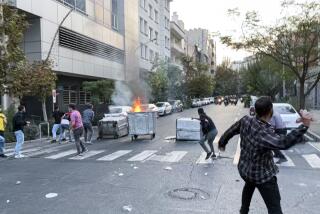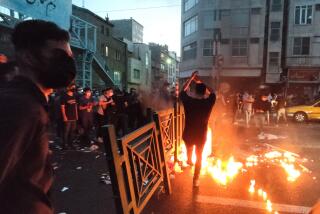Valuable lessons
- Share via
IRAN’S RELEASE OF 15 British sailors held hostage for 13 days is a tribute to the value of diplomacy. But relief over the end of the crisis is likely to be short-lived. Looming are thorny decisions about how to deal with an Iranian regime that appears determined to pursue its nuclear program and likely to continue to flex its considerable geopolitical muscle in other unpleasant ways.
Because the U.S. relationship with Tehran is likely to remain confrontational, Britain’s handling of the crisis offers a model worth studying. London did not posture or threaten the Iranians, which would have been counterproductive. Yet neither did it apologize for a territorial trespass it insists its sailors did not commit. It has since agreed to discuss with Tehran territorial issues and operations in the tense Persian Gulf, which is a good idea in any case.
Accompanying the freeing of the British sailors was the suspiciously timed release of an Iranian diplomat in Baghdad, Jalal Sharafi, who had been kidnapped by armed Iraqis of unknown loyalty two months ago. The British deny any connection, of course, as do the Iraqis and the Americans. Such denials are a diplomatic necessity, but they should not be mistaken for the truth.
The United States has every right to insist on the arrest, prosecution or expulsion from Iraq of Iranians, officials or not, who abet terrorism. But it attempts to redefine the rules of diplomatic immunity at its own peril. In this regard, even though the U.S. rejects claims by Iranian representatives to diplomatic status, it should promptly allow them consular access to five other Iranians arrested in Iraq in January -- a courtesy that Tehran pointedly denied the British sailors.
By humiliating the sailors and extracting staged “confessions,” driving up the price of oil in European markets (although it has since fallen) and then appearing magnanimous by giving the hostages their freedom, Iranian hard-liners have scored a propaganda victory, at home if not abroad. But they also have reinforced a reputation as a highly factionalized and potentially dangerous government willing to flout international norms to bolster domestic prestige.
The events of the last two weeks show how important it is that the Iranian government be deterred from acquiring nuclear weapons or the means to produce them. This lesson holds even if the tough economic sanctions required to dent Tehran’s bravado are equally punishing to Western, Russian and Chinese commercial interests, and even if mustering such international resolve requires the West to make unpleasant political compromises. But the crisis also shows that a Western strategy of speaking softly in public -- with a big stick lurking in private -- is more likely to succeed in changing Tehran’s behavior than explicit threats and bluster.
More to Read
Sign up for Essential California
The most important California stories and recommendations in your inbox every morning.
You may occasionally receive promotional content from the Los Angeles Times.










